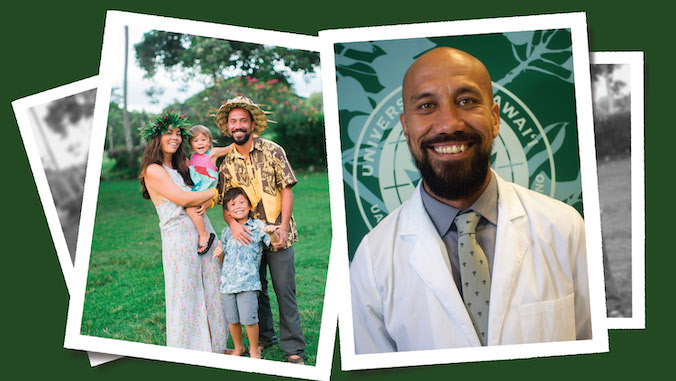
As a young father who simply wanted to provide the best care for his child, Kamuela Andrade began to crave the medical knowledge behind the rare bleeding disorder that his infant son was diagnosed with. He was inspired by his son’s pediatrician, James Raelson, who went above and beyond to care for his son, making home visits and teaching Andrade and his wife how to provide lifetime treatment in the form of daily infusions. As a lifeguard turned firefighter, Andrade naturally had a passion for helping people in dire situations.
“I’ve done a lot of rescues in my life but what he (Raelson) did for us and my son for those first few months of his life—he rescued me, he rescued my family, he rescued my son,” Andrade said. “I wanted to experience that, I wanted to do that kind of rescuing.”
ʻImi Hoʻōla offers foundational start
Andrade made the ambitious decision to pursue his third career as a doctor, but it was not without hesitation due to the financial impact it would make on him and his family. The thought of the burden almost stopped him from applying to medical school, but with the full support of his wife, he moved forward. Although he wasn’t accepted into the University of Hawaiʻi at Mānoa John A. Burns School of Medicine (JABSOM) on his first try, he was accepted into the ʻImi Hoʻōla Post-Baccalaureate Program, which Andrade considers a blessing.
“I’m so grateful that I got into ʻImi instead of getting into medical school first, because they provided me with that foundation that I needed, they taught me how to study, they taught me how to manage my time,” Andrade said.
Part of the JABSOM Department of Native Hawaiian Health, ʻImi Hoʻōla is a year-long preparatory program that recruits students from historically underprivileged or disadvantaged backgrounds. For years, The Queen’s Health Systems (QHS) has provided the students with monthly stipends, allowing students to commit their full attention to the rigorous premedical program. Upon successful completion, these students matriculate into JABSOM’s newest MD class.
Full-ride scholarship
In 2019, QHS provided four-year, full-tuition scholarships to three graduates of ʻImi Hoʻōla, including Andrade. Andrade said that receiving a full-tuition scholarship was “affirmation for everything that I’ve been through so far—what we were trying to accomplish together as a family, what my son went through and how his pediatrician inspired me to go on this path.”
Currently a second-year medical student, Andrade hopes to pursue family medicine and would like to return to Kauaʻi, where he worked as firefighter, to provide rural community health care.
“To this Queen’s scholarship and to all the donors out there: Mahalo, mahalo nui to what you guys provide for us. You give us the opportunity and the freedom to focus on what we need to focus on and become the physicians that we aspire to be. Thank you,” Andrade said.
Read more about Kamuela Andrade’s story.
—By Deborah Manog Dimaya
This is an example of UH Mānoa’s goal of Enhancing Student Success (PDF), one of four goals identified in the 2015–25 Strategic Plan (PDF), updated in December 2020.

